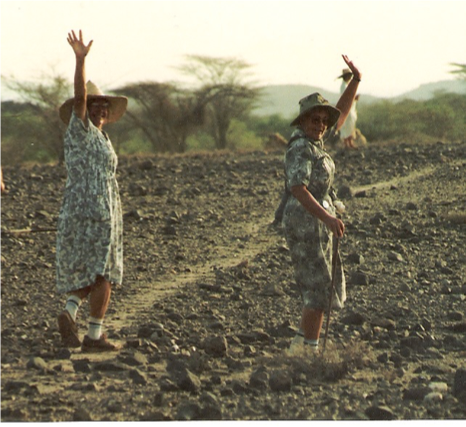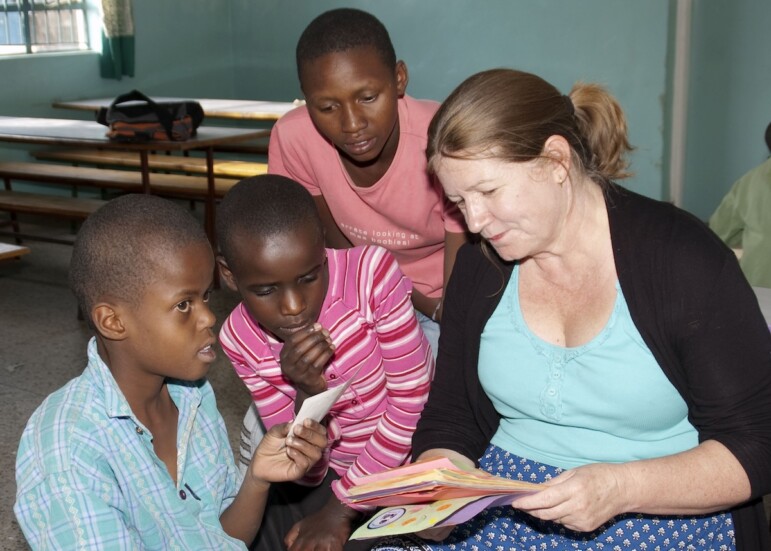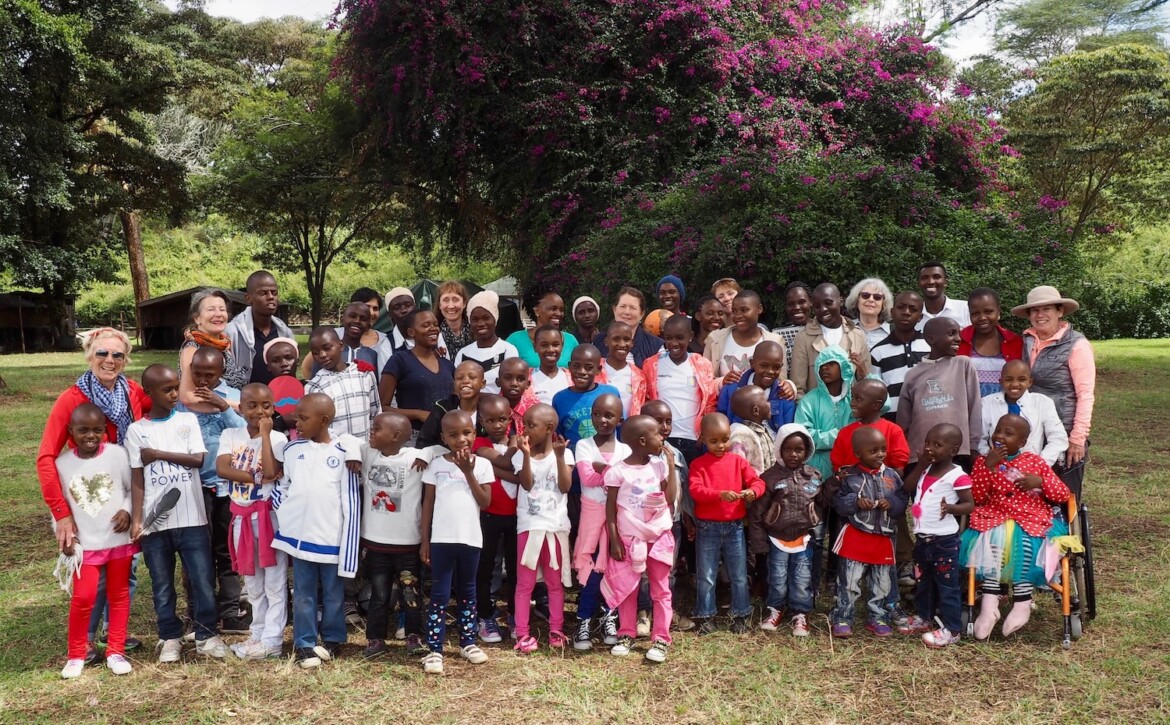More than 20 years ago, two women in their 60s walked 130 miles across the salt flats near Lake Turkana in Kenya. Dressed in flowery dresses, sun hats and sturdy hiking shoes, Anne Mitchell and Jill Simpson sought with their strenuous trek to raise funds for medical equipment for a charity that supported AIDS orphans in the East African towns of Naivasha and Gilgil. At her home thousands of miles and an ocean away in Piedmont, Briony Bax received a letter describing the women’s journey and mission from Mitchell, her late aunt. Bax recalls the letter’s impact in a Feb. 23 phone interview with the Exedra.

“I had always wanted to help children in Africa, although I’m not sure why. I’ve always worked for nonprofits and with young people and I just wanted to go see Saidia Children’s Home, the orphanage my aunt along with Jill Simpson, Theresa Wahito, and Jane Kinuthia founded in 2004,” she says.
Bax, who moved with her family 12 years ago to North Norfolk in the UK, after living in Piedmont for seven years, traveled in 2008 to visit the family-style orphanage. What was started in a small shack in Gilgil to house children from newborn to age 18 who had been left parentless by the AIDS epidemic, had by 2007 become a secure building large enough to accommodate 60 children, with separate wings for boys and girls, academic schooling, training in agriculture and other trades, and a small, but highly professional staff.
High school in Kenya is not free and data shows that only roughly 54 percent of children in the country enroll, so the charity covers those cost entirely. Graduates of the program are helped to find government funding for further education, with Saidia Children’s Charity continuing their support with scholarships to pay for books and other supplies. In addition to the home, a preschool was founded in the Bondeni, a red-light district in Gilgil. In partnership with Canadian Chalice, Saidia provides up to 75 preschool children with meals and basic educational and social instruction. In 2015, the charity that was previously registered as Mji wa Neema officially changed its name to Saidia Children’s Charity.
“When I visited in 2008, I got hooked and started going every year,” Bax says. “I wanted to do more, beyond just visiting. I realized a lot of people in Piedmont would be interested in supporting children in need in Africa, but don’t trust the organizations. I thought I could form a charity and be the conduit they could trust. So I went to Kenya and visited many organizations and decided Saidia was well run and trustworthy. We decided to focus the foundation just on Saidia and not spread ourselves too thinly.”
In 2010, Bax was walking her dog in Piedmont Park and ran into Gayle Sells, a woman she often crossed paths with in the park and knew was an active, longtime community volunteer in the local schools. “I told her about my trips and the orphanage and on a whim, asked her if she wanted to come with me.”
Sells, now 78, with four adult children, eight grandchildren, and a Piedmont resident for 35 years, remembers the moment well in a separate phone interview. “We were just chatting about Africa and the charity her aunt founded. She asked, ‘Do you want to go?’ When I said yes, I think I floored her. I just thought it would be fascinating and I had always wanted to go. I couldn’t get anyone in my family interested. The chance to go with someone who knew the ropes, it seemed like a golden opportunity. So, off we went.”
Sells joined the board of Bax’s foundation and says she will never forget highlights of her first and only trip to Kenya. “I remember spending time with the babies in the nursery. One of my family’s biggest concerns was that I’d fall in love with the children who didn’t have a mom or dad and bring them home with me when we already had a large family. My other memory is visiting the preschool and it’s a haunting memory. There was a teacher so devoted to them and then, I was reminded of how they lived their lives when they left each day. They lived in such deprived situations and here we were trying to feed them one meal a day and feed their brains before they had to go home. I felt lucky to have gone and helped.”
Following the trip with Sells in 2010, Bax says word spread and people wanting to accompany her on the bi-annual trips “just blossomed.” One woman has volunteered and traveled with her to Kenya for eleven years. Of the founders, only Kinuthia, now in her 80s, is still alive. “I and the other board members have become the next generation. We’re all volunteers and Piedmonters join because they like that all their money is going to the project and supports the professional staff and children.”

Bax was recently granted the UK’s respected MBE (Member of the Order of the British Empire) award and will be visiting Buckingham Palace to receive it from King Charles. The honor is lending visibility, importance, and a measure of excitement for the 13 volunteers accompanying her on the trip next month.
“It’s the 20th anniversary of the orphanage being built,” says Bax. “We’ll have a BBQ lunch for all the kids, graduates, staff, local politicians, and people who work with us.”
Included in the celebration will be delight related to last year’s seven graduates: three went on to university, two are enrolled in plumbing schools, and two are receiving instruction in a hair-dressing school. Bax says that even in the remotest parts of Kenya, people have mobile phones, but the graduates don’t have access to computers other than at the Gilgil library. KPMG provided laptops for the seven graduates. During the pandemic, the Kenyan governments strict guidelines caused the foundation to invest in e-readers for orphanage students. At the preschool, where most of the children’s mothers worked as prostitutes and nighttime curfews curtailed their incomes, the women were given “Shopping With Dignity” vouchers they could use at food stores to buy basic supplies. A local dairy donated milk for three months and staff rotated through two-week shifts according to mandated protocols.
The cost to volunteers traveling to Kenya for food, lodging, and drivers is kept low, this year roughly $140 per day, but airfare is expensive and can range up to $1,000. According to Sells, the rewards of working with the children far outweigh the price and knowing every penny earned and spent by the charity goes to the children and “an incredibly well-run, honest, targeted, well-meaning organization” is incredible. “We don’t look for a pat on the back; we look for the letters we get from the children who write to us about what is happening in their lives. When you’ve had a little bitty part in making their lives successful, it’s so wonderful.”

Photos courtesy of Briony Bax
